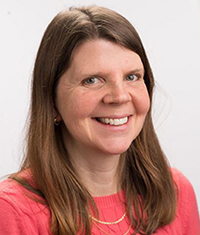Claire Tomlin is a pioneer in hybrid control systems research, particularly aeronautical applications to address problems in aircraft flight control and collision avoidance.
She has developed algorithms to help determine when unsafe conditions may arise as variables and interactions become increasingly complex. Her work includes issues of autonomous control of a team of unmanned aerial vehicles.
Her research holds potential applications in fields ranging from military operations to business strategies to power grid control. Tomlin is a professor of electrical engineering and computer sciences at the University of California at Berkeley, where she holds the Charles A. Desoer Chair in Engineering.

Tomlin will deliver the Vanderbilt School of Engineering’s spring 2021 John R. and Donna S. Hall Engineering Lecture on Wednesday, March 17, at 4 p.m. Her lecture—Safe Learning in Robotics—is open to the public. Register for the live webinar here.
She has pioneered methods for computing the reachable set to encompass all behaviors of a hybrid system, which makes it possible to verify that the system stays within a desired safe range of operation and to design controllers to satisfy constraints. In 2006, at 37, she won a MacArthur Foundation “Genius” Fellowship.
For the Hall Lecture, Tomlin will review robot learning specifications and applications related to collision avoidance and avionics design in air traffic management systems and networks of unmanned aerial vehicles. She will present a toolbox of methods inspired by machine learning to enable performance improvement while maintaining safety, and she will illustrate these “safe learning” methods on robotic platforms at Berkeley, including demonstrations of motion planning around people, and navigating in a priori unknown environments.
Her work has been tested in simulation and UAV test flights and applied to and flown on two large commercial platforms.
Her method was used to compute collision zones for two Boeing aircraft paired approaches and was flown on a Boeing T-33 test aircraft, flying close to a piloted F-15. The F-15 pilot flew “blunders” into the path of the T-33, which used Tomlin’s algorithm to avoid collision.
Tomlin’s method also was used to derive a minimum safe distance between Scania transport trucks driving in high-speed platoons for fuel savings and revealed that the relative distance used today can be reduced significantly with this automation. Her work is also being considered for application in the Next Generation Air Transportation System and in Unmanned Aerial Vehicle Traffic Management.
In 2019, Tomlin was elected to the National Academy of Engineering and the American Academy of Arts and Sciences. She is an IEEE Fellow and an AIMBE Fellow. In 2017, she won the IEEE Transportation Technologies Award in 2017 for contributions to air transportation systems.
Tomlin received her bachelor’s degree in electrical engineering at the University of Waterloo in Ontario, Canada, in 1992. A year later, she earned her master’s degree in electrical engineering from Imperial College, London. She completed her doctoral studies in electrical engineering and computer science at UC Berkeley, earning her Ph.D. in 1998. She held faculty positions at Stanford University from 1998-2007, and in 2005 joined Berkeley.
Established in 2002, the John R. and Donna S. Hall Engineering Lecture Series allows Vanderbilt engineering students to hear renowned engineers from universities and agencies address engineering topics of particular interest.
Contact: Brenda Ellis, 615 343-6314
brenda.ellis@vanderbilt.edu